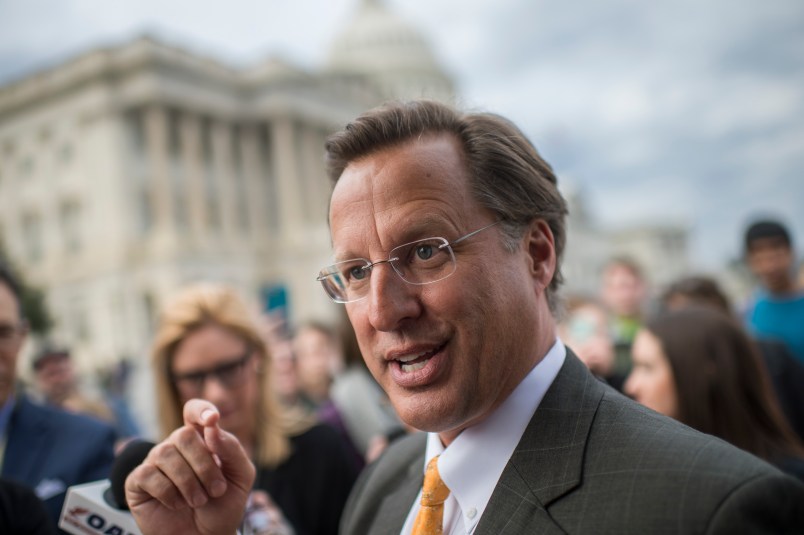Republicans in Congress are in a bind. House conservatives are complaining that the Donald Trump-endorsed bill to repeal the Affordable Care Act retains or replicates too many of its rules and provisions. But if these members prevail in stripping out those provisions, the bill has no chance of passing the more moderate Senate—where any non-budgetary modifications to the health care law must clear a 60-vote threshold and where Republicans currently hold only 52 seats.
To solve this conundrum, Freedom Caucus member and current holdout on the bill Rep. David Brat (R-VA) told reporters Thursday that the Senate should blow up its 60-vote rule and push the bill through with 51 votes—overruling the Senate parliamentarian. Brat described it as “going nuclear,” a term which in recent political history has meant blowing up the Senate filibuster. This is a different scenario, but the upshot would be similar: avoiding a Senate filibuster.
Holding court with reporters in the ornate House Speakers’ Lounge after a vote on Thursday, Brat complained that House Speaker Paul Ryan (R-WI) has urged Republicans to be mindful of the Senate’s rules, which limit what policies they can include in their bill.
“He wants to be respectful of the Senate rules. I do not,” Brat said. “We’re getting information that everything we want is being blocked in the Senate—insurance regs stuff especially. But I don’t buy that. Whoever is sitting in the chair can rewrite the rules.”
The rule that would need to be overriden is the Byrd Rule—Brat derided it as the “bird bath” rule— which imposes limits on the legislative process that Republicans want to use to pass Obamacare repeal. The process, known as reconciliation, requires only a majority vote and thus avoids a filibuster. Under the Byrd rule, it can only be used on legislation that impacts the federal deficit.
Brat is calling for an amendment to the bill that repeals the essential benefits requirement, allowing people to purchase cheap insurance plans that don’t cover basic services and preventative care. Ryan and other GOP leaders say changes to those regulations could come in a later “phase” of their health care overhaul, but that isn’t fast enough for hardline conservatives like Brat.
“Is it true that we can’t change insurance regs?” Brat asked reporters Thursday. “Because that is the cost driver. If you could change that, you could get me to a yes [on the bill]. It seems incomprehensible to me that we can’t.”
Brat was initially under the impression that the Senate passed most of the Affordable Care Act through reconciliation. Reporters who covered the 2009 battle corrected him, explaining that Democrats had 60 votes at the time and only used the reconciliation process for a few final regulations once they lost their 60-vote supermajority due to the death of Sen. Ted Kennedy (D-MA).
“I stand corrected,” he said, before directing the gathered reporters to describe him as “humble” in their reports.
Post-correction, Brat continued to insist that repealing Obamacare is so important that the Senate should be willing to “go nuclear.”
“Look, [health care] is one-fifth of the economy and we have to structure this thing right,” he said.
Brat is not the only House Republican grumbling about the limitations imposed by the Senate’s rules. Fellow Freedom Caucus member Rep. Trent Franks (R-AZ) told TPM on Wednesday that if not for concern about the Byrd Rule, House Republicans would already have found “consensus” on a plan.
“To put a health care repeal and replacement through the Byrd Rule is like trying to put a giraffe through a keyhole. He’ll be a little beat up on the other side,” Franks quipped. “The Byrd Rule changes everything. I don’t know how to explain it. It’s like putting dirt in ice cream. You can’t fix it after that.”
But other House Republicans, including Rep. Michael Burgess (R-TX), say that even under the reconciliation rules, Congress can still approve the same basic repeal of Obamacare that passed both chambers in 2015. That bill, like the one currently under consideration, garnered the votes of almost every Republican despite the fact that it left many regulations in place.
“If people want to complain about the fact that pre-existing conditions are the same now, they were the same in 2015,” Burgess told reporters Thursday. “We did not repeal preexisting conditions. We did not repeal lifetime limits. We did not repeal the essential health benefits. We did not repeal kids on their health insurance to age 26. Those weren’t things that were available to us, under the reconciliation rules in 2015, and they aren’t available to us under the reconciliation rules under 2017.”







This guy needs to be taken out back and just beat the living shit out of him.
Among its other flaws, this clown’s proposal rests on at least one monumentally faulty premise, i.e., that every Republican Senator will vote for this legislative abomination. It’s unlikely that it would get even a simple majority - not every legislator is suicidal.
Always the way with Republicans, isn’t it?
“Rules are for chumps.”
“Taxes are for little people.”
“We’re above the law.”
Today’s GOP: They don’t even try to hide it any more.
This Brat is way over-cooked and way past his expiration date. He wouldn’t cut the mustard.
This is the guy who complains about women up in his grill. He has a Ph.D., which, legitimately,makes him a “whackademic”